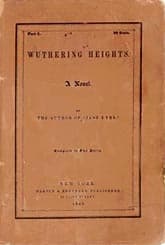Wuthering Heights
Critique • Quotes • Text • At the movies
 First U.S. edition, 1848
First U.S. edition, 1848First publication
1847 in England
Literary form
Novel
Genres
Literary
Writing language
English
Author's country
England
Length
Approx. 116,000 words
The devil's appeal
I'm somewhat stumped by Wuthering Heights. It's solidly ensconced in the literary canon and inflicted on classes of students. And plenty of people—readers and writers alike—seem to love it.
But three readings at various times in my life have left me as indifferent as my first exposure to it in high school.
It's not that I think it's bad. It's not that I don't recognize how cleverly it's structured—with the story being told by several narrators, often second and third-hand, so we cannot entirely rely on any one person's impressions, and with the various symmetries of plot that commentators are always pointing out. (Though I'm not sure why this latter point is so exemplary—life is not so neatly balanced, so why should our literature be?) And it's not that I don't recognize a great enigmatic character is created in the figure of Heathcliff.
But the problem is that I find it all so (and here's the worst thing that can be said about any work of art) boring.
By now, those who love Wuthering Heights must be gasping. Boring? They have become entirely wrapped up in the emotional intensity of this novel and cannot understand how anyone could be left cold by it.
But mine is not the kind of boredom that comes from nothing of significance happening. Rather the kind that arises from things happening—the same things happening—over and over. Yes, it's all very dense, tense and intense. But enough already. I really don't care enough about the characters to put up with their endless whinging, their continual longings and upheavals. I can't believe in them, and so I cannot participate in their overwrought emoting, any more than I can stand to watch more than fifteen minutes of a soap opera.
Yes, there's a germ of interest near the beginning, when the wretched little Heathcliff is adopted into the Earnshaw family of country gentlefolk. His mistreatment at the hands of young Hindley Earnshaw, among others, and his closeness to Hindley's sister Catherine set up a tension similar to that found in Dickens's stories of abused youth.
But the rest of the novel consists of Heathcliff's revenge on everyone, well into the next generation. He's as villainous as they come, the menfolk he opposes are weak and insipid, and the women folk are stronger but also stupid. Especially the second half of the novel, after his original antagonists have died off, just drags and drags through the inevitable steps of his eventual victory over all.
And then it all ends anticlimactically. Goodness is restored.
Daughters of Frankenstein
Emily Brontë, along with her sisters, was much influenced by Mary Shelley's Frankenstein and the Gothic strain is strong in Wuthering Heights, as in Charlotte Brontë's Jane Eyre.
Wuthering Heights also shares with Shelley's book the creation of a unique (at the time) central figure who both repels and attracts. Heathcliff is repeatedly presented as a devil, a man of darkly inhuman drive and power. Evil, no doubt. But we are drawn to him, fascinated by him.
At least that's the experience of those who fall in love with this book, for whom it is a great romance of dark passions.
Sorry, I've never been able to buy into it. As I'm reading it I just wish someone would shoot Heathcliff and get it over with.
Or I wish at least someone would shake the idiotic men and women around him to their senses, so they would act like real people in real life for a change. I can't help suspecting Emily Brontë had no concept of how other people live, love and think.
But, of course, if this is your kind of novel, you're probably not interested in how real people live, love and think.
Or rather, to be fair, you may feel that the heightened, almost ecstatic, sensibilities in such art can reveal something profound about what's really going on behind how we appear to live, love and think in the real world.
I can appreciate that. I might even get into it with certain books.
But not with Wuthering Heights.
— Eric
Critique • Quotes • Text • At the movies

